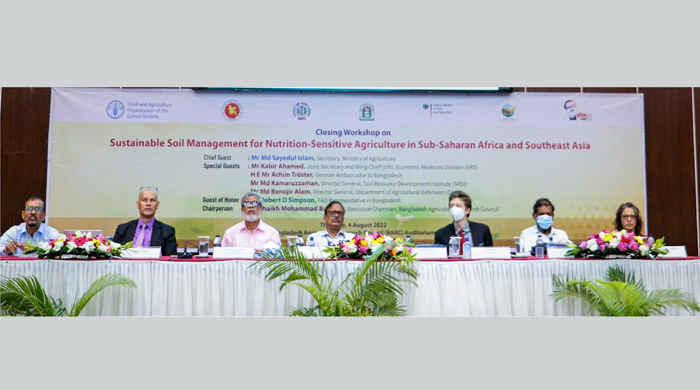
DHAKA, Aug 4, 2022 (BSS) - Food and Agriculture Organization of the United Nations (FAO) today organised a workshop here on the occasion of the closing of its project “Sustainable Soil Management for Nutrition-sensitive Agriculture in Sub-Saharan Africa and Southeast Asia”.
Md Sayedul Islam, Secretary, Ministry of Agriculture, Florian Höllen, Head of Development Cooperation, Embassy of the Federal Republic of Germany, Md Kamaruzzaman, Director General, Soil Resource Development Institute (SRDI); Kabir Ahamed, Joint Secretary and Wing Chief (UN), Economic Relations Division (ERD), Robert D. Simpson, FAO Representative in Bangladesh and Carolina Olivera Sanchez from FAO HQ, among others, spoke at the workshop with Dr Shaikh Mohammad Bokhtiar, Executive Chairman, BARC, in chair, a FAO press release said.
Robert D. Simpson, FAO Representative in Bangladesh, said “Global soil degradation is estimated at 33 percent, and policymakers around the world are looking for solutions to implement the Sustainable Development Goals (SDGs) to combat this challenge”.
In order to improve the nutritional value of foods grown locally, the government of Bangladesh and the Global Soil Partnership (GSP) initiative of the FAO launched the project in September 2019 with the funding from the German government.
Its goal is to promote and support the use of Sustainable Soil Management (SSM) for nutrition-sensitive agriculture. The Bangladesh Agricultural Research Council (BARC) and the Soil Resource Development Institute (SRDI) of the Ministry of Agriculture implemented the project.
In addition to Bangladesh, the FAO also implemented the initiative in Malawi and Burkina Faso.
The goal of the "Sustainable Soil Management for Nutrition-sensitive Agriculture in Sub-Saharan Africa and Southeast Asia" project was to develop the SSM policy guidelines based on existing knowledge and a multidisciplinary approach to show the role of the soil in human health.
The project activities included field demonstrations in three Upazilas in Bangladesh, as well as a baseline survey of 600 farmers, 45 field demonstrations, awareness development training for 180 stakeholders, and soil doctor training for 450 farmers.